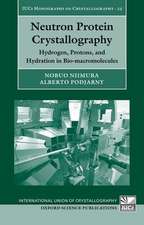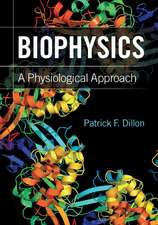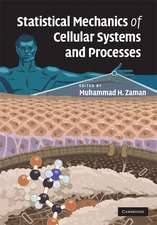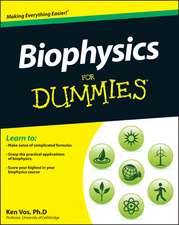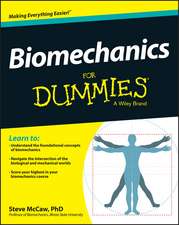Cell and Tissue Organization in the Circulatory and Ventilatory Systems: Biomathematical and Biomechanical Modeling of the Circulatory and Ventilatory Systems, cartea 1
Autor Marc Thirieten Limba Engleză Paperback – 14 iul 2013
The present volume is devoted to cellular events that allow adaptation to environmental conditions, particularly mechanotransduction. It begins with cell organization anda survey of cell types in the vasculature and respiratory tract. It then addresses cell structure and functions, especially in interactions with adjoining cells and matrix.
| Toate formatele și edițiile | Preț | Express |
|---|---|---|
| Paperback (1) | 599.13 lei 38-44 zile | |
| Springer – 14 iul 2013 | 599.13 lei 38-44 zile | |
| Hardback (1) | 669.20 lei 6-8 săpt. | |
| Springer – 8 sep 2011 | 669.20 lei 6-8 săpt. |
Preț: 599.13 lei
Preț vechi: 748.91 lei
-20% Nou
Puncte Express: 899
Preț estimativ în valută:
114.68€ • 124.61$ • 96.39£
114.68€ • 124.61$ • 96.39£
Carte tipărită la comandă
Livrare economică 17-23 aprilie
Preluare comenzi: 021 569.72.76
Specificații
ISBN-13: 9781461428961
ISBN-10: 1461428963
Pagini: 748
Ilustrații: XII, 736 p.
Dimensiuni: 155 x 235 x 39 mm
Greutate: 1.04 kg
Ediția:2011
Editura: Springer
Colecția Springer
Seria Biomathematical and Biomechanical Modeling of the Circulatory and Ventilatory Systems
Locul publicării:New York, NY, United States
ISBN-10: 1461428963
Pagini: 748
Ilustrații: XII, 736 p.
Dimensiuni: 155 x 235 x 39 mm
Greutate: 1.04 kg
Ediția:2011
Editura: Springer
Colecția Springer
Seria Biomathematical and Biomechanical Modeling of the Circulatory and Ventilatory Systems
Locul publicării:New York, NY, United States
Public țintă
ResearchCuprins
Introduction.- 1. Cells and Tissues.- 2. Cells of the Blood Circulation.- 3. Cells of the Ventilatory Tract.- 4. Cell Structure and Function.- 5. Protein Synthesis.- 6. Cell Cytoskeleton.- 7. Plasma Membrane.- 8. Extracellular Matrix.- 9. Intracellular Transport
References.- Notations: Aliases and Symbols.- Notations: Prefixes and Suffixes.- Biochemical, Medical and Physical Aliases.- Mathematical Symbols, Molecules, and Physical Quantities.- Index.
References.- Notations: Aliases and Symbols.- Notations: Prefixes and Suffixes.- Biochemical, Medical and Physical Aliases.- Mathematical Symbols, Molecules, and Physical Quantities.- Index.
Notă biografică
Textul de pe ultima copertă
The volumes in this authoritative series present a multidisciplinary approach to modeling and simulation of flows in the cardiovascular and ventilatory systems, especially multiscale modeling and coupled simulations. The cardiovascular and respiratory systems are tightly coupled, as their primary function is to supply oxygen to and remove carbon dioxide from the body's cells. Because physiological conduits have deformable and reactive walls, macroscopic flow behavior and prediction must be coupled to nano- and microscopic events in a corrector scheme of regulated mechanisms. Therefore, investigation of flows of blood and air in physiological conduits requires an understanding of the biology, chemistry, and physics of these systems together with the mathematical tools to describe their functioning.
The present volume is devoted to cellular events that allow adaptation to environmental conditions, particularly mechanotransduction. It begins with cell organizationand a survey of cell types in the vasculature and respiratory tract. It then addresses cell structure and functions, especially in interactions with adjoining cells and matrix.
The present volume is devoted to cellular events that allow adaptation to environmental conditions, particularly mechanotransduction. It begins with cell organizationand a survey of cell types in the vasculature and respiratory tract. It then addresses cell structure and functions, especially in interactions with adjoining cells and matrix.
- Describes cell types, functions, and fate in the regulated activities of the circulatory and respiratory systems
- Presents applications of mechanics and mathematics for an understanding and prediction of function in health and disease
- Integrates biology, chemistry, and physics for a multidisciplinary understanding of physiological flows
Caracteristici
Describes cell types, functions, and fate in the regulated activities of the circulatory and respiratory systems Presents applications of mechanics and mathematics for an understanding and prediction of function in health and disease Integrates biology, chemistry, and physics for a multidisciplinary understanding of physiological flows









